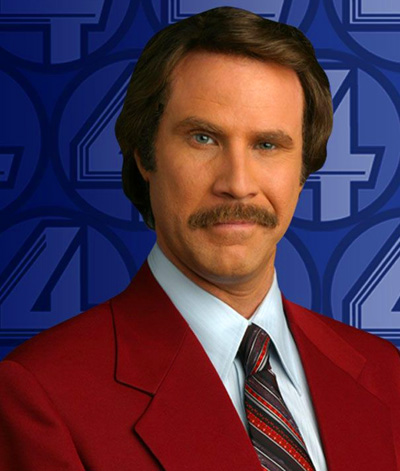I’m Kind of (not) a Big Deal

At last we come to the end: Act justly, love mercy, and walk humbly. Now for the “walk humbly” part.
It would be hard to argue the fact that Will Ferrell’s supreme gift is his ability to create  characters that are big, loud, dumb - yet somehow lovable – horse’s rear ends. In so doing, he exposes the tendency in us all to think a little more highly of ourselves than our actual greatness merits. The prima facie case, of course, is his ass-ertion in “Anchor Man”:
“I’m not sure how to say this, but I’m kind of a big deal.”
I think most of the time I’m painfully aware of my own weaknesses and shortcomings. But there are days. Days when it’s easy to believe you are the sharpest crayon in your little box. Which reminds me of a North Dakotan joke (we tell those in Montana): What do you call a North Dakotan with half a brain? A genius. You see what I mean? Now I’ve isolated my North Dakotan readership with arrogant presumption and derision of their mental proficiencies. If they have finally gotten the Internet there, I’m hosed!
And God asks us to walk humbly with Him. Which leads the finite logical mind to start down a road of self-justification. We ask:
“Why does God care if we are humble? If He’s so great and we’re so..not great, what’s He trying to prove? Does He need us to grovel to feel good about Himself? Does He just want us constantly reminded we are less than navel lint? Is He that insecure?”
 Here on July 4th I thought I would take the few quiet moments I have before heading out to blow stuff up (in celebration of the freedom to blow stuff up, of course), to do what every other blogger is doing – comment on America.
Here on July 4th I thought I would take the few quiet moments I have before heading out to blow stuff up (in celebration of the freedom to blow stuff up, of course), to do what every other blogger is doing – comment on America. Continuing on my public processing of vexing questions, let’s pick up here – I promised to post “the things I am mostly almost pretty sure are true about justice. Maybe.” And so I shall. At least I shall try.
Continuing on my public processing of vexing questions, let’s pick up here – I promised to post “the things I am mostly almost pretty sure are true about justice. Maybe.” And so I shall. At least I shall try.